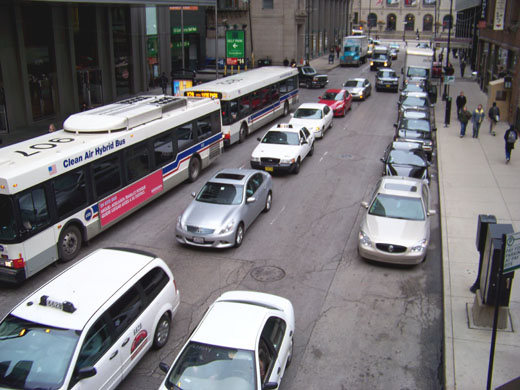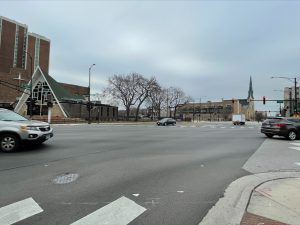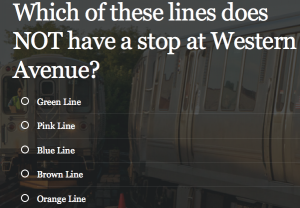
Chicago’s public transit organizations support proposed legislation that would increase the gas tax in the city by 0.4 of a cent per gallon.
Meg Reile, a spokesperson for Metra, said the bill is a good first step in meeting Metra’s need.
“We support this bill as a good first step toward addressing a large amount of unfunded needs to transit infrastructure,” Reile said. “Our need is much greater than what this bill in its current form could provide. ”
The money Metra would receive would go towards replacing rails, improving stations and purchasing new equipment, she said
Catherine A. Hosinski, a CTA media representative, said the CTA also supports the proposal, which would contribute to a more robust transit system.
“The CTA supports the concept of using Motor Fuel Tax for transit since transit contributes to making our roadways less congested.” Hosinski said. “Motorists and transit riders alike benefit from a robust transit system.”
If passed, proposed legislation from Sen. Martin Sandoval (D-Chicago), will raise the gas tax by almost half a percent.
The bill amends the Motor Fuel Tax Law. It states that the tax rate imposed on fuel in the metropolitan area will be increased or decreased on Jan. 1 of each year beginning in 2013. This rate would change depending on the percentage change of the consumer price the year before.
The proposed tax is estimated to generate $11.6 million in 2013 and $168 million over the next five years, according to the Active Transportation Alliance, a non-profit organization that promotes public transportation. The revenue from the increase would go to CTA, Metra and Pace, according to the alliance.
Over the course of five years, revenue from a proposed gas tax increase for the Chicago-land area could raise a projected $168 million in revenue, according to a non-profit promoting public transportation. The revenue would fund improvements for public transportation.
While the proposed bill is supported by Metra and CTA, higher gas costs could hurt other businesses that rely on motorists.
Carlos Bermudez, manager at South Loop Auto, has been working at the parking lot for about six years and has spent a total of 12 years working in the parking business.
“Six years ago it was crazy,” Bermudez said. “We had a lot of cars and it was always busy.”
He said a lot of people have turned to public transportation as a way to save money. Bermudez said he believes the parking industry in Chicago will slowly decline, but people are will always be willing to pay for gas.
Some Chicago residents, like Oscar Leon, continue to use their cars as a means of transportation. Leon said he believes the bill would not be as beneficial as it may seem.
“It’s going to affect the working people,” Leon said. “I’m still going to drive my car. The oil companies are the only ones who are going to benefit.”
The last time the gas tax was raised was in 1990. Jay Jiwani, an economics professor at Robert Morris University, said that the tax on gas in 1990 is considerably less than what the tax is today considering other categories of taxes imposed.
Photo slideshow by Victoria Coleman
“Generally, any time that there is a tax hike the consumers end up paying more, but at the same time the government does get revenue –0. 19 cents in 1990 compared to what we pay today is not that high. Today we pay about 33 to 44 cents per gallon”, he said Jiwani attributes higher gas taxes not solely to political factors.
“There are many factors that influence the gas tax, not just politics. It has to do with crude oil, the refineries, gas station owners and whether they have a higher markup, it has to do with demand in supply and how many consumers there are,” Jiwani said. “Today, we are close to 7 billion people and the income level for our population is rising so anytime you have more people, the demand for something goes up as well as the price.
Caitlin Baxa, Victoria Coleman, Colin M. Hill, Sean McEntee, Tianna Rosa and Sarah Salgado contributed to this report.
Video by Sean McEntee
Related articles
- Grid Chicago Interviewing Aldermen on Sustainable Transportation (chicagotalks.org)


















Be First to Comment